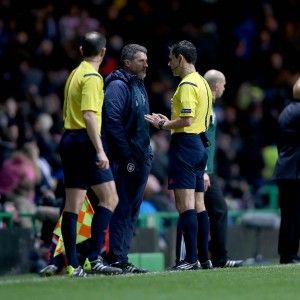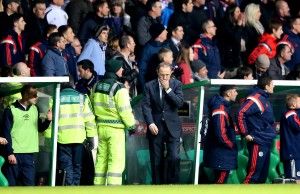It always seems to be the way, but Irish football has more questions than answers as the year comes to an end
No, the ever dwindling number of Irish players at the game’s elite level is not main one – that problem is present at the end of every calendar year.
As 2014 draws to a close, there are more immediate issues to address, and they centre on the stewardship of the national team.
Martin O’Neill, the decorated manager, and Roy Keane, the most high-profile assistant manager in the history of football, face a crucial year. If 2015 in any way mirrors this year, then the national team could be steering into the abyss.
The focus on numerous off-field events dwarfed the attention afforded to Ireland’s performances this year.
O’Neill and Keane were dubbed a ‘dream team’ when appointed in October 2013. In terms of profile and column inches, the two men have lived up to their billing. Yet has the Irish team really progressed from the final days of Giovanni Trapattoni? It’s still relatively early days but missing out on Euro 2016 is now a real possibility.
Keane is such a controversial and compelling figure there will be possibly never be a time when interest in his life wanes. It certainly hasn’t been boring, but so far there are few hard facts that suggest the assistant manager’s coaching input outweighs the attention his presence generates.
The players and O’Neill say Keane is a positive presence on the training ground and he very well may be.
Yet during his time as a television analyst, the Cork man rarely seemed concerned with the tactical aspects of the game and, when manager of Sunderland and Ipswich, he frequently delegated coaching duties to his staff.
Keane undoubtedly possesses vast football experience and knowledge, but it was never apparent that he was destined to be a coach. There has been talk amongst fans, and media outlets, that Keane is perhaps more suited to international management, citing his potential ability to inspire and extract performances due to his direct nature and charismatic presence.
However, even at the Irish team’s lowest point no one could ever validly claim they lacked motivation. The players need coaches to frame and harness their enthusiasm, to wed it with a cohesive tactical plan, designed to make the side greater than the sum of their parts. It remains to be seen if Keane can contribute to this. There was little sign of such during his time as assistant coach at Aston Villa.

What is in no doubt whatsoever though is Keane’s position as a lightning rod for attention. O’Neill, while at times appears tetchy at being constantly asked about his deputy, evidently feels it is worth the cost, possibly because it has distracted from some of the side’s failings.
The manager would no doubt immediately dispute this. Fans would have just cause to cite Ireland’s result against Germany – the most an Irish fan has had to celebrate in years – as evidence for O’Neill’s positive influence on the side.
However, Ireland’s performance in the Scotland loss points to a number of pressing concerns. The team are essentially in a mini-group with Poland and Scotland. Without being overly presumptuous, the mighty German machine will spark into life next year and bulldoze their way to Euro 2016.
Every team will defeat Gibraltar, and, barring an upset, Georgia. This leaves three teams fighting for two spots, one of which being a play-off place. Currently Ireland are trailing and appear the weakest.
Before October’s tie against Ireland, Scotland manager Gordon Strachan said he and his counterpart were ‘old-fashioned‘. Ireland’s tactics during the game seemed archaic. O’Neill opted for a 4-4-2 formation, with Shane Long and Jonathan Walters up front, dropping main goal threat Robbie Keane to the bench, and leaving Ireland’s midfield outnumbered.
Charlie Mulgrew was made to look like some highland Xavi as Ireland struggled to pick up the roaming Steven Naismith and Shaun Maloney.
Granted the Irish team were weakened by the absence of their first-choice central midfield pairing, James McCarthy and Glenn Whelan, but all the more reason to start a third player in the position. It had seemed the only reason to play such a formation was to accommodate Robbie Keane, yet the game was the first time in 13 years he had failed to start a qualifier when he was available.
Ireland’s tactical frustrations were further compounded by the stunting of Seamus Coleman’s attacking outlet and, at the times, the team were reminiscent of the worst elements of the Trapattoni years.
Hitting long-balls, yet not backing them up with pressure from midfield, cautious and overworked, Ireland fatally switched off as Scotland scored a well-executed goal. There is an argument to be made such a moment is a reflection of the work carried out by the respective management teams. If so, Ireland’s came up short.
Anyone who has followed O’Neill’s career will be familiar with his exuberant touchline antics and ability to raise the performances of his sides.
He was touted as one the game’s brightest managers and had fantastic success with Celtic and Leicester City.
After returning to England his time with Aston Villa ended acrimoniously, before his career seemed to bottom out at Sunderland. The Germany result pointed to a potential managerial renaissance for O’Neill, but the Scotland game further emphasised the evidence present before he took the Ireland job. It seems as though the modern game has surpassed him.

A sea change occurred in football in 2008. Spain’s team of small, technically gifted players blazed a trail through the European Championship.
For years midfield had been deemed the land of the giants, physicality ruled as Patrick Vieira, Steven Gerrard and Roy Keane became the benchmark for the position.
Being a good footballer alone was not sufficient; players had to be lung-busting athletes. Spain broke the mould. When Pep Guardiola’s Barcelona swept all before them in 2009, winning a historic treble of titles, it was confirmed; a new phase in football had begun.
Managers and teams were forced to adapt or perish as the dominance of both sides continued over the next five years. The current world champions are a hybrid of the two styles, combining German physicality with Spanish technique.
From Bayern Munich and Borussia Dortmund to Liverpool, Southampton and Everton in the Premier League, to the national teams of Chile, Italy and Japan, the influence of Barcelona and Spain remains omnipresent throughout world football.
Teams can be viewed as either being influenced by this change, or a reaction against it and most managers operating at the elite level, including international football, have adapted. Even if it is at a most basic level of not allowing the team’s central midfield to be outnumbered in favour of a more physical presence up front.
However, judging by his final days with Sunderland, and Ireland’s display against Scotland, O’Neill seems rooted to the past. He still seemingly favours the traditional ‘British’ style of 4-4-2, laced with physicality and effort and designed to hit a big-man up top early. O’Neill was, after all, Emile Heskey’s manager for over six years of his career.
He approached the Scotland tie as though it was a traditional ‘British’ derby game and was tactically outwitted by Strachan. One could argue Ireland do not possess the players to play any other way. But they would probably say the same about Scotland. In a game of apparent equals, the Irish team were made to look distinctly the lesser of the two.
2015 will be the most pivotal year for the Irish national team in recent memory. There are crucial qualifiers against Poland and Scotland, as well as Germany and a high profile friendly with England. The prize at stake is qualification for Euro 2016, which has been expanded to 24 teams, almost half of the teams in Europe.
If Ireland fail to qualify, it will surely be the lowest ebb of the Irish team. Even Keane’s presence will not be able to deflect from that.











































